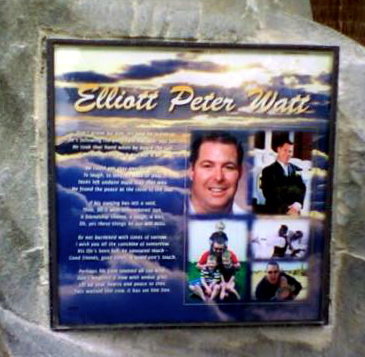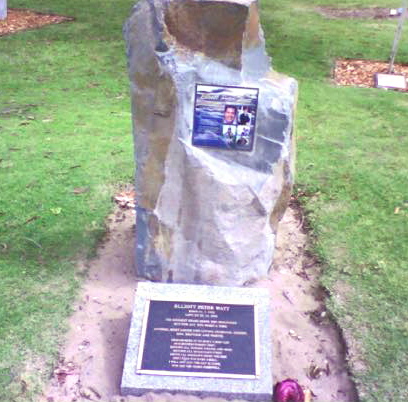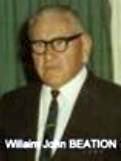Elliott Peter WATT
Elliott Peter WATT
Western Australia Police Force
Regd. # ?
Rank: Sergeant
Stations: ?, Kondinin, Collie ( acting OIC ) – death
Service: From ? ? ? to 22 December 2008 = 15 years Service
Awards: ?
Born: 31 July 1972
Died on: 22 December 2008
Cause: Suicide – Service firearm – in the Station Armoury
Age: 36
Funeral date: ?
Funeral location: ?
Buried at: ?
Memorial at: ?
Date of Inquest: 13 – 16 February 2012
Date of Inquest finding: 20 March 2012
ELLIOTT is NOT mentioned on the Police Wall of Remembrance * BUT SHOULD BE
Funeral location: ?
FURTHER INFORMATION IS NEEDED ABOUT THIS PERSON, THEIR LIFE, THEIR CAREER AND THEIR DEATH.
PLEASE SEND PHOTOS AND INFORMATION TO Cal
Police officer’s death not suspicious: police
Updated
Police from the internal affairs unit are investigating the death of an officer at the Collie Police Station, south of Perth.
Sergeant Elliott Watt was found dead in the armoury room of the station yesterday.
Police say he shot himself with a police issued firearm.
Speaking outside the station this morning, Commissioner Karl O’Callaghan said local officers were shocked.
“This has affected all of the police officers and their families,” he said.
“It’s a very a tragic situation that’s occurred at a difficult time of the year when we’re moving up to Christmas.”
Sergeant Watt was the second in charge at the station and had been in Collie for 12 months.
He leaves behind a wife and four children, aged 11, five, three and 18 months.
His death is not been treated as suspicious, and his fellow officers are being offered counselling.
http://www.abc.net.au/news/2008-12-23/police-officers-death-not-suspicious-police/248500
Coronial inquiry into police officer’s suicide
Updated

The Perth Coroner’s Court has heard that exposure to a number of critical incidents, including fatalities, could have contributed to a police officer’s suicide.
The Coroner has begun an inquiry into the death of Elliot Peter Watt, 36, at the Collie police station in 2008.
Sergeant Watt, who was the acting officer-in-charge of the station, had four sons.
His body was discovered in the station’s armoury alongside his police-issue firearm.
The Coroner is investigating what impact the daily access to firearms had on the sergeant and whether WA police had adequate mental health safety checks in place.
His wife, Emma Watt, told the court her husband was deeply affected by his work.
Mrs Watt told the inquiry her husband’s mental health started to deteriorate when he was stationed in Kondinin and he had to attend a number of critical incidents with limited or no back up.
She said these included a serious car accident involving children, a farmer’s suicide and an unsuccessful attempt to resuscitate a footballer.
Mrs Watt said he was never offered counselling by WA Police and bottled up his emotions.
Earlier today, the court was told Internal Affairs investigated Sergeant Watt’s death and found there was no single work related incident that triggered his death.
The family’s lawyer said the critical incidents were just as likely to contribute to the suicide as any family problems.
The inquiry also heard Sergeant Watt was depressed in the the years leading up to his death and was looking for another job.
The inquest continues tomorrow.
http://www.abc.net.au/news/2012-02-13/coronial-inquiry-into-police-officer27s-suicide/3827158
COUNTRY policeman Elliott Watt cleaned up after a farmer’s suicide, tried unsuccessfully to resuscitate a young footballer and was brought to tears by a child’s injuries from a car crash in the months before he told his wife he did not want to go to work anymore.
The senior sergeant shot himself at the Collie police station in Western Australia’s southwest after telling his wife everything was getting to him.
In an inquest that is throwing a spotlight on the difficult work of police in isolated rural stations, Watt’s widow, Emma, said her husband killed himself because he did not want his moods affecting their three children. He took his life three days before Christmas 2008.
The night before, Watt broke down and told his wife everything was getting to him and he had had enough of work.
Giving evidence yesterday, Mrs Watt said she had to get her husband out of bed each morning, make sure he had a shower and make him get dressed and go to the station.
She had earlier told the court about three critical incidents her husband had been involved in while he was the officer in charge at Kondinin, a town of 300 people 275km southeast of Perth.
She said she had found her husband crying after attending a car accident in which a child was injured. He had tried unsuccessfully to resuscitate a young football player, and he had to clean the ute of a farmer who had killed himself in it with a shotgun.
She said her husband had become withdrawn after the transfer to Collie.
She said he had expressed feelings of “nothingness”, played less with the children and could not sleep or concentrate.
The next morning, Watt showered and dressed himself. “That’s why the day he died was so unusual,” she said.
Later that day, he took a gun from the station’s armoury and shot himself.
If you are depressed or contemplating suicide, help is available at Lifeline on 131 114.
Coroner calls for police wellness checks
Posted
The Police Union says it is unfortunate the suicide of a police officer had to be the catalyst for reform in WA’s police service.
The coronial inquest into the death of Acting Senior Sergeant Elliott Watt concluded yesterday.
Sergeant Watt shot himself at the Collie Police Station in 2008.
Coroner Alistair Hope has recommended WA police conduct annual health and wellness reviews on every police officer in the State.
The President of the Police Union Russell Armstrong says more resources are needed.
“Not enough staff within health and welfare, four clinical psychologists for nearly 6000 people and we’re dealing with 24/7 critical incidents,” he said.
“And that is not enough staff, so it’ll have to be resourced and resourced very quickly.
“It’s long overdue and should have been put in place a long time ago,” he said.
WA police are yet to review the recommendations.
http://www.abc.net.au/news/2012-03-10/mental-health-checks-for-police/3881424
Office of the State Coroner, Western Australia – Annual report – 2011 – 2012
Elliott Peter WATT
The State Coroner conducted an inquest into the death of Elliott Peter Watt (the deceased) with an Inquest held at Perth Coroner’s Court on 13‐16 February 2012. The State Coroner found that death occurred on 22 December 2008 at Collie Police Station, Collie, as a result of gunshot wound to the head in the following circumstances ‐
The deceased was an acting Senior Sergeant of police with Western Australian Police (WA Police) at the time of his death on 22 December 2008. The deceased was born on 31 July 1972 and so was 36 years of age at the time of his death.
The deceased died at the Collie Police Station as a result of a self inflicted gunshot wound. At the time he was the relieving Officer in Charge of the Collie Police Station, the day of his death
was his first day back at work after a period of three weeks long service leave.
On the day of his death the deceased worked from 8am and had been conducting his normal duties as the Officer in Charge of the Police Station throughout the day. It appears that he was last seen at about 3:45pm.
The deceased was discovered in the armoury at 4:25pm having died of a gunshot wound to the head.
The deceased used the Glock pistol which had been allocated for his own use to shoot himself while alone in the armoury of the Collie Police Station.
None of the police officers on duty at the Collie Police Station heard the shot being fired and none were alert to the possibility that the deceased might be about to take his own life prior to his doing so.
The State Coroner found that the death arose by way of Suicide.
The State Coroner observed that it was important that families of serving members are alert to the available services as it is often family members who are most aware of changes in a person suffering from mental health problems.
In that context the State Coroner made the following recommendation –
I recommend that WA Police take action to better promote information in relation to available services to families of serving members.
The State Coroner observed that the deceased’s colleagues were not alert to his deteriorating mental condition. This was in large part because the deceased concealed his condition from them, but it is also clear that they had received little training in the management or identification of persons suffering from depression.
Evidence at the inquest revealed that for officers taking on senior management roles, while training in respect of these issues is available, it is at present not a mandatory requirement.
The State Coroner made the following recommendation –
I recommend that training in respect of the identification and management of officers suffering from stress or depression should form part of the training for police officers entering management roles.
The State Coroner made the following recommendation in respect to improving the recording of conversation with the Health and Welfare Branch of WA Police in the context of evidence relating to contacts which had not been recorded or filed –
I recommend that WA Police ensure that there is in place appropriate computer software which will enable the recording of all contacts to the Health and Welfare Branch relating to individual officers where concerns have been expressed as to the welfare of those officers.
The State Coroner observed that the evidence in this case has highlighted the fact that policing can be a demanding and stressful occupation.
The deceased was described as a very good officer who was generally highly regarded and yet none of his work colleagues had any real appreciation of his deteriorating mental health.
In the State Coroner’s view there needs to be some form of regular health review or wellness review of every police officer in WA Police.
In this context the State Coroner made the following recommendation –
I recommend that WA Police put in place a system which would ensure that in respect of every member there is some form of wellness review conducted or at least offered each year which will identify significant changes in physical and mental health.
A letter dated 20 March 2012 addressed to the Minister for Police invited the Minister to respond to the State Coroner’s recommendations. At the time of publishing the annual report a response had not been received from the Minister’s office.
http://www.coronerscourt.wa.gov.au/_files/Coroners_Court_Annual_report_12.pdf
I remember my husband spending 3 nearly whole days in 45*C + heat scrubbing a farmers ute to give back to his widow. It had sat in full sun for nearly a week and as the OIC in a country town you do it yourself – and he wouldn’t let me help, he always wanted to protect me from the nasty side of the job. 3 days stressing it was pristine, immaculate; nothing left to distress the farmers family further. He didn’t realise the toll it took on himself. He was Beginning to realise he was battling inside his own mind with these thoughts….I still remember him saying to me ” Everyday. Everyday I get kitted up and think how easy it would be. ”
It will be 8 years this year. And still no closer to acknowledging those already lost, and helping, saving, those suffering.
So sad….Everyday I think, how easy it would be. Easy it would be to stop talking and start doing. Helping. Acknowledging. Remembering. Sharing. Supporting. And stop this waste!
Retired WA policewoman seeks compensation
https://www.wapu.org.au/images/ReportsSubmissions/WAPU_ProjectRecompense_Compiled.pdf





Emma, It’s Danny……please contact me. I’m out of the job and need to speak to you – fents11020@gmail.com
Hope you and the boys are well 🙂
9 years on and I miss him more every day.